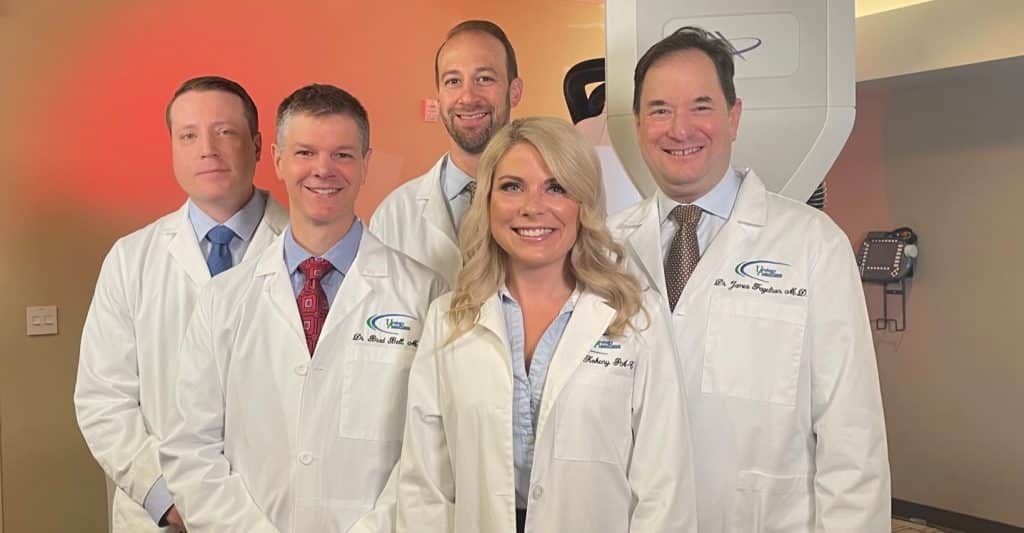Personalized Care for Every Stage of Prostate Cancer
The Comprehensive Prostate Cancer Clinic (CPCC) at Urology Associates utilizes state of the art care to manage every aspect of a patient’s prostate cancer journey. We carefully provide each patient with coordinated medical care, which is a key factor in improving outcomes and quality of life.
The Comprehensive Prostate Cancer Clinic combines evidence-based medicine with compassionate care to provide patients with personalized treatment options that are focused entirely on prostate cancer, CPCC provides total care, from diagnosis, through a variety of treatment options, and on to long-term follow-up.
Four Types of Prostate Cancer
Prostate cancer begins in the tissues of the prostate, the male sex gland responsible for the production of semen. Prostate cancer is the second most common cancer in American men. If caught early, prostate cancer can be treated and cured. Routine prostate cancer screenings allow for early diagnosis and greatly improve the survival rate.
Every case of prostate cancer is different, making it important to evaluate all available treatment options and determine the best plan of care for each individual patient. Many new treatments are available and several more are on the way, which can lead to longer life and a better quality of life for men with prostate cancer.
Prostate cancer can be broken down into four categories, each with its own treatment plan.
- Hormone-sensitive prostate cancer – This is prostate cancer that is being controlled by keeping the testosterone level as low. Testosterone is fuel or nutrition for prostate cancer cell growth. Reducing testosterone cannot cure prostate cancer but can keep it from growing.
- Hormone-resistant prostate cancer – This is prostate cancer that keeps growing even when the amount of testosterone in the body is reduced to very low levels through the use of hormones or surgical removal of the testes. Many early-stage prostate cancers need normal levels of testosterone to grow, but hormone-resistant prostate cancers can still grow even when testosterone levels are low.
- Non-metastatic prostate cancer – This is prostate cancer that has not spread to other parts of the body. If the prostate-specific antigen (PSA) levels in the blood continue to rise despite treatment, it is a sign that the prostate cancer has spread (metastasized). Other signs of spread include elevated liver enzymes or new, lower back pain. To determine if the cancer has spread, a physician will order a bone scan, CT scan, MRI, or a specialized PET scan.
- Metastatic prostate cancer – This is prostate cancer that has spread to other parts of the body. Prostate cancer most commonly spreads to the bones or lymph nodes, but it can spread to any organ in the body.
The Comprehensive Prostate Cancer Clinic currently offers patients with prostate cancer a variety of advanced and innovative treatments and medications to treat all types of prostate cancer.
Treatments Available For Prostate Cancer

Radiation therapy – Radiation therapy uses high-energy rays or particles to kill cancer cells or slow their growth by damaging their DNA. Radiation therapy can be used in combination with androgen deprivation therapy (ADT), especially if the cancer has spread beyond the prostate or if the cancer is aggressive. At Urology Associates, we are proud to coordinate radiation treatment care with our partner practice Anova Cancer Care in Lone Tree. CyberKnife® is minimally invasive and simply a different way of delivering radiation therapy that is more accurate, preserves healthy tissue and offers a shorter course of treatment.
Surgery – The main surgery for prostate cancer is a radical prostatectomy, which consists of removing the entire prostate gland and some adjoining tissue. This surgery is performed via robotic-assisted radical laparoscopic technique or with an open approach.
Hormone Therapy – These medications are known as ADT (androgen deprivation therapy) therapy and they lower testosterone (a reproductive hormone) that stimulates prostate cancer growth.
- Relugolix (Orgovyx). The only FDA approved pill form of ADT
- Leuprolide (Lupron). Lupron is an injection given in the office at regular intervals – monthly or every three, four, or six months.
- Leuprolide (Eligard). A form of Lupron that is able to be injected into the subcutaneous tissue of the arm, abdomen, thigh, or buttocks.
- Bicalutamide (Casodex). This medication is a pill taken once a day and often given for a couple of weeks and up to a month prior to starting leuprolide therapy. It helps to block a testosterone flare that can cause pain or complications.
- Degarelix (Firmagon). Degarelix is another injectable medication that is injected into the subcutaneous tissue of the abdomen every 28 days.
Advanced Prostate Cancer Treatments
Advanced prostate cancer is when the cancer has metastasized and spread beyond the prostate. There are many treatments available through the Advanced Prostate Cancer Clinic to treat and improve the quality of life for individuals. Our team will discuss possible side effects and monitoring guidelines prior to starting treatment
Immunotherapy – Immunotherapy treats prostate cancer by activating or suppressing one’s own immune system. Sipuleucel-T (PROVENGE) is made from your own immune or white blood cells which collected, processed and then infused back into the body via an IV infusion. This treatment can be used alone or with other treatments such as hormone therapy or radiation.
Radiopharmaceuticals – Radiopharmaceuticals are radioisotopes bound to biological molecules able to target specific organs, tissues or cells within the human body. These radioactive drugs can be used for diagnosis and treatment. Radium-223 (Xofigo). This is an IV radiopharmaceutical infusion used for prostate cancer that has only spread to the bones (metastatic hormone–resistant prostate cancer). Radium-223 is offered at Anova Cancer Care and is injected once a month for six months.
Androgen Receptor Inhibitors/Blockers (ARI) – These treatments work to keep testosterone from binding to proteins called androgen receptors. Preventing this blocks the growth and spread of the cancer cell. These treatments are often used with hormonal therapies
- Apalutamide (Erleada). This treatment is approved for non-metastatic castrate-resistant prostate cancer and metastatic castrate-sensitive prostate cancer.
- Enzalutamide (Xtandi). This is approved for non-metastatic prostate cancer metastatic prostate cancers.
- Darolutimide (Nubeqa). This medication is approved for non-metastatic prostate cancer. It may sometimes be used in combination with chemotherapy medication.
- Abiraterone (Zytiga). This is approved for metastatic prostate cancer and must be taken with prednisone.
- Olaparib (Lynparza). Can be used in patients with advanced stage disease with genetic components.
Chemotherapy – Chemotherapy is also available for patients with advanced prostate cancer and the Comprehensive Prostate Cancer Clinic will coordinate with medical oncologists to deliver chemotherapy.
- Docetaxel (Taxotere). An IV chemotherapy drug that can be used alone or in combination with other drugs such as leuprolide. This is the first-line chemotherapy choice for advanced prostate cancer.
- Cabazitaxel (Jevtana). An IV chemotherapy drug that can be used alone or in combination with other drugs and is commonly a second-line treatment.
Patients may also be eligible for clinical trial enrollment under the direction of a medical oncologist.
Comprehensive Cancer Care

Bone Health – Maintaining bone health is important for men with prostate cancer to decrease the risk of fracture. Low bone density leads to osteopenia and osteoporosis which can be a result of hormone therapy or when cancer that has spread to the bone. Our team may order a DEXA scan to monitor bone density while on Hormone Therapy. This scan may be ordered at initial diagnosis and any time there is a concern for spread of cancer to the bone.
Lifestyle modifications such as smoking cessation, limiting alcohol intake, weight-bearing activity with Medications can be also be prescribed to help strengthen bones and decrease the risk of fractures. Denosumab (Prolia) is given as a subcutaneous injection for patents with non-metastatic prostate cancer. For patients with bone metastasis, denosumab (Xgeva) can be given as a monthly subcutaneous injection.
Genetic Testing – The Comprehensive Prostate Cancer Clinic offers genetic testing that looks for changes, sometimes called mutations or variations in your DNA. This testing has two primary benefits:
- Testing allows children to know if they are at higher risk for genetically-based cancers
- Newer genetically-targeted treatments are available for advanced stage disease
Symptom Management, Palliative Care, and Hospice Services – The Comprehensive Prostate Cancer Clinic team is available to help manage symptoms related to cancer and cancer treatments throughout the entire cancer journey. There are many treatment choices depending on the specific cancer stage, risk factors, symptoms, overall health, and if the cancer has metastasized.
CPCC will work with each patient to help manage, control, or alleviate symptoms and their impact on the quality of life and daily activities. The CPCC medical team is available to answer questions and have discussions about any health care decisions across the spectrum, from initial diagnosis and early disease to discussions about comfort or hospice care when advanced treatments are no longer good options.
In-Office Dispensary/Pharmacy – Urology Associates has an in-office dispensary at its Littleton office, open Mondays, Tuesday, Thursdays and Fridays. The dispensary is able to conveniently dispense many of the oral prostate cancer medications in office. A pharmacy tech is also available to provide counseling on new drugs. The Comprehensive Prostate Cancer Clinic team helps patients explore financial assistance opportunities, including foundation grants and co-pay cards, when available.
Get the Care You Deserve at the Comprehensive Prostate Cancer Center

James Fagelson, MD, FACS – CPCC Medical Director
Dr. Fagelson has been caring for prostate cancer patients in the Denver area since 2000. His goal is to treat each patient with compassion and make sure they understand their options for every level of prostate cancer care and treatment.
Kristie Kokeny, PA-C – CPCC Lead Physician Assistant
Kristie has spent her career working in urologic oncology with a focus in prostate cancer. Prior to coming to Colorado in 2021, Kristie worked for Memorial Sloan Kettering Cancer Center in New York City, where she developed a passion for helping patients understand their complex diagnosis and supporting them through their treatment plan.
Nichie Willcox, RN, MSN – CPCC Nurse Navigator
Toni Foos, RN, BSN, CIC, CPHQ – CPCC Nurse Navigator
Anthony Daniels, CPhT – Pharmacy Technician

